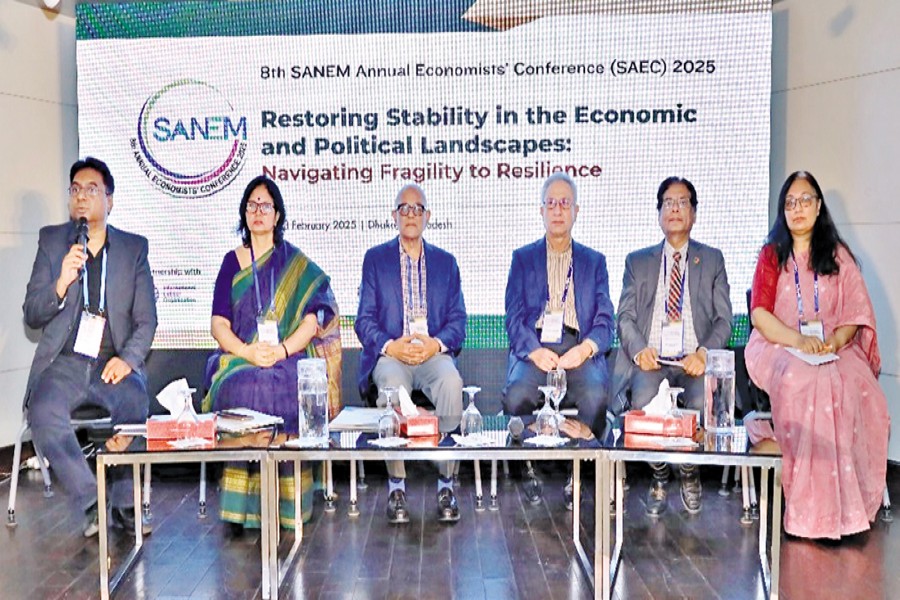FE Report
Experts underscored the urgent need for comprehensive reforms to restore stability in Bangladesh’s economic and political landscape.
They highlighted that achieving long-term resilience requires strengthening the financial, agricultural, educational, and healthcare sectors. Now is the time for necessary changes, which have been long delayed, they said.
They were addressing a session titled “Restoring Stability in the Economic and Political Landscapes: Navigating Fragility to Resilience,” on the last day of the 8th SANEM Annual Economists’ Conference (SAEC) 2025 in Dhaka, held from February 21 to 23 at the BRAC Centre Inn.
Speaking on the occasion, Dr. Selim Raihan opened the session by introducing the ‘White Paper Committee on the State of the Economy’ and the ‘Task Force on Re-strategizing the Economy.’ He explained how these two bodies complement each other, with the White Paper focusing on identifying irregularities and setting benchmarks, while the Task Force dives deeper into both macro and micro reforms.
Dr. KAS Murshid spoke about the culmination of the ongoing crisis in September, arguing that economists have long recognised the need for reforms that could only be implemented during an interim government. He emphasised the importance of strengthening the financial and agricultural sectors to restore financial stability.
In his speech, Dr. Zahid Hussain discussed the government’s financial and power sector reforms, which he referred to as “firefighting” efforts, while also addressing the ongoing IMF loan situation. He laid emphasis on a more sustainable approach to managing these sectors. Bangladesh is already in middle income trap, he said.
Professor Mustafizur Rahman pointed out the challenges in external sectors, including trade mispricing and the impact of LDC graduation. He stressed the need to move toward direct taxes and productivity-driven competitiveness rather than relying on indirect taxes.
Mr Rahman said the smart choice for Bangladesh should be graduating from LDC. If Bangladesh doesn’t graduate by the deadline, Afghanistan and Bangladesh would remain only two LDC countries in South Asia.
Professor Sharmind Neelormi highlighted shortcomings in educational and environmental policies, lambasting a lack of moral accountability among the public.
Dr. Rumana Haque drew attention to the neglected healthcare sector, urging better investment management to address issues like non-functional medical equipment and an unregulated private healthcare industry.
A lively question-and-answer session followed, where participants discussed key issues such as supply chain vulnerabilities, uneven economic growth, and the future of finance in Bangladesh. The conference provided a vital platform for experts to exchange ideas on how Bangladesh can navigate its path from fragility to resilience.
[email protected]

